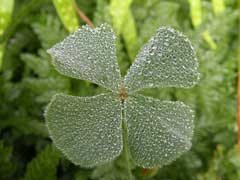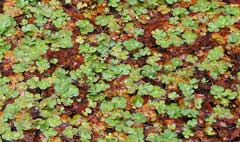 |
|
http://www.flickr.com/photos/liangjinjian/ |
 |
| http://commons.wikimedia.org/wiki/User:Casliber |
Translate this page:
Summary
Physical Characteristics

 Marsilea drummondii is a FERN growing to 0.3 m (1ft).
Marsilea drummondii is a FERN growing to 0.3 m (1ft).
See above for USDA hardiness. It is hardy to UK zone 9 and is frost tender. The species is hermaphrodite (has both male and female organs).
Suitable for: light (sandy), medium (loamy) and heavy (clay) soils. Suitable pH: mildly acid, neutral and basic (mildly alkaline) soils. It can grow in semi-shade (light woodland) or no shade. It prefers wet soil and can grow in water.
UK Hardiness Map
US Hardiness Map
Synonyms
Plant Habitats
Bog Garden; Cultivated Beds;
Edible Uses
Edible Parts: Seed
Edible Uses:
Spores - cooked[144]. A source of starch, the spores can be ground into a powder and used like flour[154]. They are astringent and highly indigestible[154]. The spores are contained in a sporocarp[154].
References More on Edible Uses
Medicinal Uses
Plants For A Future can not take any responsibility for any adverse effects from the use of plants. Always seek advice from a professional before using a plant medicinally.
None known
References More on Medicinal Uses
The Bookshop: Edible Plant Books
Our Latest books on Perennial Plants For Food Forests and Permaculture Gardens in paperback or digital formats.

Edible Tropical Plants
Food Forest Plants for Hotter Conditions: 250+ Plants For Tropical Food Forests & Permaculture Gardens.
More

Edible Temperate Plants
Plants for Your Food Forest: 500 Plants for Temperate Food Forests & Permaculture Gardens.
More

More Books
PFAF have eight books available in paperback and digital formats. Browse the shop for more information.
Shop Now
Other Uses
References More on Other Uses
Cultivation details
Plants are hardy to about -7°c in Australian gardens[157], though this cannot be translated directly to British gardens due to our cooler summers and longer, colder and wetter winters[K].
References Carbon Farming Information and Carbon Sequestration Information
Temperature Converter
Type a value in the Celsius field to convert the value to Fahrenheit:
Fahrenheit:
The PFAF Bookshop
Plants For A Future have a number of books available in paperback and digital form. Book titles include Edible Plants, Edible Perennials, Edible Trees,Edible Shrubs, Woodland Gardening, and Temperate Food Forest Plants. Our new book is Food Forest Plants For Hotter Conditions (Tropical and Sub-Tropical).
Shop Now
Plant Propagation
Spores. The plant produces sporocarps, these need to be lightly abraded and then immersed in water. The sporocarps will then swell and burst to release the spores. The spores germinate immediately, the highly developed prothallus remains inside the large seed-like spores. The gametophyte generation is completed in 24 hours and the first roots and shoots appear in 2 - 3 days. Mature plants bearing sporocarps can develop in as little as 3 months[200]. Spore germination in the family occurs after rupture of the sporocarp wall allows the sporocarp contents to be hydrated. A gelatinous structure emerges from the sporocarp, breaking it into valves and carrying the sori into the water. Spore germination (gametophyte growth) and fertilization occur immediately[270]. Division.
Other Names
If available other names are mentioned here
Native Range
AUSTRALASIA: Australia (New South Wales, Queensland, South Australia (southeast), Victoria, Western Australia (s. & w.), Northern Territory)
Weed Potential
Right plant wrong place. We are currently updating this section.
Please note that a plant may be invasive in one area but may not in your area so it's worth checking.
Conservation Status
IUCN Red List of Threatened Plants Status :

Growth: S = slow M = medium F = fast. Soil: L = light (sandy) M = medium H = heavy (clay). pH: A = acid N = neutral B = basic (alkaline). Shade: F = full shade S = semi-shade N = no shade. Moisture: D = dry M = Moist We = wet Wa = water.
Now available:
Food Forest Plants for Mediterranean Conditions
350+ Perennial Plants For Mediterranean and Drier Food Forests and Permaculture Gardens.
[Paperback and eBook]
This is the third in Plants For A Future's series of plant guides for food forests tailored to
specific climate zones. Following volumes on temperate and tropical ecosystems, this book focuses
on species suited to Mediterranean conditions—regions with hot, dry summers and cool, wet winters,
often facing the added challenge of climate change.
Read More
Expert comment
Author
A.Braun.
Botanical References
154200
Links / References
For a list of references used on this page please go here
Readers comment
© 2010, Plants For A Future. Plants For A Future is a charitable company limited by guarantee, registered in England and Wales. Charity No. 1057719, Company No. 3204567.